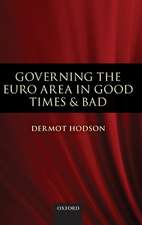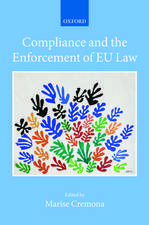European Integration, Processes of Change and the National Experience: Palgrave Studies in European Political Sociology
Editat de S. Börner, M. Eigmülleren Limba Engleză Hardback – 28 mai 2015
| Toate formatele și edițiile | Preț | Express |
|---|---|---|
| Paperback (1) | 379.01 lei 6-8 săpt. | |
| Palgrave Macmillan UK – 2015 | 379.01 lei 6-8 săpt. | |
| Hardback (1) | 384.86 lei 6-8 săpt. | |
| Palgrave Macmillan UK – 28 mai 2015 | 384.86 lei 6-8 săpt. |
Din seria Palgrave Studies in European Political Sociology
-
 Preț: 399.62 lei
Preț: 399.62 lei - 15%
 Preț: 632.64 lei
Preț: 632.64 lei - 18%
 Preț: 988.46 lei
Preț: 988.46 lei -
 Preț: 386.18 lei
Preț: 386.18 lei - 15%
 Preț: 573.32 lei
Preț: 573.32 lei - 15%
 Preț: 685.23 lei
Preț: 685.23 lei - 15%
 Preț: 495.05 lei
Preț: 495.05 lei -
 Preț: 379.01 lei
Preț: 379.01 lei - 18%
 Preț: 771.26 lei
Preț: 771.26 lei - 18%
 Preț: 986.44 lei
Preț: 986.44 lei -
 Preț: 419.85 lei
Preț: 419.85 lei - 18%
 Preț: 726.08 lei
Preț: 726.08 lei -
 Preț: 374.84 lei
Preț: 374.84 lei - 18%
 Preț: 937.87 lei
Preț: 937.87 lei - 18%
 Preț: 713.17 lei
Preț: 713.17 lei - 15%
 Preț: 636.05 lei
Preț: 636.05 lei - 15%
 Preț: 575.10 lei
Preț: 575.10 lei -
 Preț: 223.94 lei
Preț: 223.94 lei - 15%
 Preț: 575.56 lei
Preț: 575.56 lei - 15%
 Preț: 461.34 lei
Preț: 461.34 lei - 15%
 Preț: 576.37 lei
Preț: 576.37 lei - 18%
 Preț: 768.75 lei
Preț: 768.75 lei - 15%
 Preț: 517.02 lei
Preț: 517.02 lei - 15%
 Preț: 684.62 lei
Preț: 684.62 lei - 15%
 Preț: 686.85 lei
Preț: 686.85 lei - 15%
 Preț: 686.40 lei
Preț: 686.40 lei - 18%
 Preț: 778.05 lei
Preț: 778.05 lei - 15%
 Preț: 464.57 lei
Preț: 464.57 lei -
 Preț: 377.88 lei
Preț: 377.88 lei -
 Preț: 383.18 lei
Preț: 383.18 lei - 15%
 Preț: 683.78 lei
Preț: 683.78 lei -
 Preț: 419.20 lei
Preț: 419.20 lei - 15%
 Preț: 699.68 lei
Preț: 699.68 lei -
 Preț: 384.31 lei
Preț: 384.31 lei - 18%
 Preț: 717.24 lei
Preț: 717.24 lei -
 Preț: 381.27 lei
Preț: 381.27 lei - 15%
 Preț: 690.71 lei
Preț: 690.71 lei - 15%
 Preț: 689.13 lei
Preț: 689.13 lei -
 Preț: 384.68 lei
Preț: 384.68 lei
Preț: 384.86 lei
Nou
Puncte Express: 577
Preț estimativ în valută:
73.68€ • 75.77$ • 61.12£
73.68€ • 75.77$ • 61.12£
Carte tipărită la comandă
Livrare economică 18 februarie-04 martie
Preluare comenzi: 021 569.72.76
Specificații
ISBN-13: 9781137411242
ISBN-10: 1137411244
Pagini: 286
Ilustrații: XIII, 299 p.
Dimensiuni: 140 x 216 x 18 mm
Greutate: 0.49 kg
Ediția:2015
Editura: Palgrave Macmillan UK
Colecția Palgrave Macmillan
Seria Palgrave Studies in European Political Sociology
Locul publicării:London, United Kingdom
ISBN-10: 1137411244
Pagini: 286
Ilustrații: XIII, 299 p.
Dimensiuni: 140 x 216 x 18 mm
Greutate: 0.49 kg
Ediția:2015
Editura: Palgrave Macmillan UK
Colecția Palgrave Macmillan
Seria Palgrave Studies in European Political Sociology
Locul publicării:London, United Kingdom
Cuprins
Preface PART I: EUROPEAN INTEGRATION MEETS HISTORICAL SOCIOLOGY: AN INTRODUCTION 1. Comparing Processes of Change: How European Integration Can Learn from Past Experiences; Stefanie Borner and Monika Eigmuller 2. Europe as Process? On the Genealogy of a Historical-Sociological Research Programme; Rainer Schutzeichel PART II: COMPARING PROCESSES OF STATE BUILDING 3. The European Union in Historical Comparison: Achieving Scale by Accommodating Diversity; Gary Marks 4. Rome under Seven Hills? An Archaeology of European Private Law; Sabine Frerichs and Teemu Juutilainen 5. Building Culture: The Architecture and Geography of Governance in the European Union; Kathleen R. McNamara PART III: NATIONAL SOCIAL POLICY MAKING AND EUROPEAN PERSPECTIVES 6. Socio-histoire and Public-Policy Rescaling Issues: Learning from Unemployment Policies in Germany (1870-1927); Benedicte Zimmermann 7. A socio-histoire of Europeanisation: Methodological Perspectives for Analysing Social Policy in a European Context; Monika Eigmuller and Nikola Tietze 8. From National to European Solidarity? The Negotiation of Redistributive Spaces; Stefanie Borner 9. Comparing Contexts. Preconditions for the Rise of a Genuinely European Social Policy; Georg Vobruba PART IV: CONSTRUCTING SOCIETIES NOW AND THEN 10. The Saga of Europeanisation: On the Narrative Construction of a European Society; Hans-Jorg Trenz 11. European Integration by Cross-Border Exchange. Actors in Transnational and National Spaces in the Emerging Civil Society since the late Eighteenth Century; Arnd Bauerkamper 12. Europeanisation and Social Movements: Before and after the Great Recession; Donatella della Porta and Louisa Parks
Recenzii
"The political crisis in Europe is forcing an expanded vision of the field of EU studies in which the relation of polity building to underlying social forces is re-examined. Drawing together a first class set of authors, this volume establishes new resources for answering difficult questions about the confused past, contested present, and possible futures of the European Union."
- Adrian Favell, Sciences Po, France
- Adrian Favell, Sciences Po, France
Notă biografică
Arnd Bauerkämper, Free University of Berlin, GermanyDonatella della Porta, Italian Institute of Human Sciences, Italy and European University Institute, ItalySabine Frerichs, University of Helsinki, FinlandTeemu Juutilainen, University of Helsinki, FinlandGary Marks, University of North Carolina, Chapel Hill, USAKathleen R. McNamara, Georgetown University, USALouisa Parks, University of Lincoln, UKRainer Schützeichel, University of Bielefeld, GermanyNikola Tietze, Hamburg Institute for Social Research, GermanyHans-Jörg Trenz, University of Copenhagen, DenmarkGeorg Vobruba, University of Leipzig, GermanyBénédicte Zimmermann, École des Hautes Études en Sciences Sociales, France


















